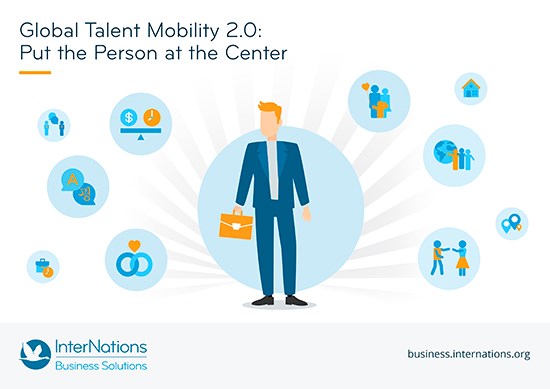 25.11.2019
25.11.2019
Global Talent Mobility 2.0: It’s About Focusing on the People
There’s a shift in the relocation needs of individuals moving abroad for work, writes Theresa Häfner, Head of Business Solutions at InterNations. With her expat expertise, she explains this shift, how it should be embraced by employers, and the mutual benefits it holds.
Af Theresa Häfner, Head of Business Solutions, InterNations
Concepts such as new work, employee experience, and work-life balance are becoming more and more prominent in HR — and it should also become more and more prominent in global mobility. Why? Because employees expect more from employers and from work in general — they want to see meaning in their job, to have impact, and to do more of what they like, and actually want, to do. While salaries play less of an important role, work-life balance and other benefits are highly valued.
Personal Life and Individuality Matter More than Career — Full Stop
A greater focus on the personal aspects of life than career aspects is especially true for younger generations — Generation Y and Z. Therefore, work and how it is organized shifts into new directions, where people and their needs are put more in focus, and the role of the individual and using his or her full potential are more important than before.
New Work is all about offering flexibility in work life, keeping individual employees engaged and intrinsically motivated, as well as enabling them through collaboration, instead of hierarchies and directive leadership styles. While this approach includes practical offers, such as remote work, flexibility with work hours, collaborative work styles, and job-sharing options, it is not limited to a “tool box”. It is a whole new mindset for work and work culture.
Why is this so important within the context of global mobility? Because people can no longer just be moved from point A to point B because of an organization’s need. They desire a personal and authentic experience, as well as meaning in their life, work, and tasks.
They want personal growth — not just a next career step. And they want this for their partner and family too. Therefore, good work-life balance, as well as a healthy personal and social life outside of work are important.
Employees are not willing to sacrifice as much as before for the job. Enjoyment and well-being play more important roles in general. This is why they not only expect more support when moving abroad, but also different types of support. They want to have a choice — not a one-size-fits-all package defined by the organization.
Employees moving abroad for work desire personalized offers that suit their personal needs — allowing them to have autonomy and make individual decisions. Moreover, they want to use the offerings whenever they want, wherever they want, and how they want. These include digital offers, peer-to-peer support, and other innovative solutions.
It’s About Putting the Person at the Center
Global mobility teams need to, therefore, accept that sending employees abroad entails more than just moving them from point A to point B. These expats leave everything behind — their social network, friends, family, and familiar environment. The only things they have with them are in the physical moving boxes and suitcases. But what about their emotions, personal challenges, and in the end, the person as a whole? These factors are exactly why a holistic approach to expat support and expat packages is needed. The more personal and social aspects of relocation also need to be taken into consideration by employers.
The Expat Insider 2018 Business Edition, a report based on the InterNations Expat Insider survey of 18,135 expats, identified big needs with personal and social support for foreign assignees, international hires, and relocating spouses. For example, 59% of foreign assignees that stated unhappiness abroad blamed a lack of socializing opportunities for their unhappiness and 45% blamed the lack of a personal support network. While 61% missed access to local networking opportunities, 64% missed receiving membership in an expat organization. Furthermore, the top reason for the unhappiness of relocating spouses was the lack of a personal support network, while 47% were unhappy because they didn’t have enough socializing opportunities and 68% missed access to local networking opportunities.
Assignment success is only guaranteed once these types of needs are also met because they have a major impact on the organization’s success and respective KPIs, such as productivity at work, employee retention, prevention of assignment failure and early return, higher employee satisfaction levels, and even less trouble for the responsible HR teams.
The Positives and Negatives of (Un)Supported Expats
On the positive side, if expats are well supported and have a good experience abroad, they develop themselves — they learn and grow personally. They gain an open mindset and acquire intercultural skills and flexibility. Expats leave their comfort zone and accept new challenges, and when they can be rewarded through benefits and solid employer support, it is all the more worthwhile. Also, with suitable personal support they don’t remain in an expat bubble but are socially integrated and experience life abroad to the full.
On the downside, there are of course also negatives when expats are poorly supported and from personal experience, these tend to dominate the positives. Negative factors include loneliness, not having support networks, missing out on happenings back home, and giving up their private life — as they have to start their new life abroad from scratch. There’s a huge personal risk for these individuals and being in an unknown environment in many ways, such as business and culture, only increases the risk.
As expats often relocate with their partner and family, the decision to move for their career adds a lot of additional responsibility. It does not only affect their own life, but it has a major impact on their family too. This burden weighs even more if the relocation constitutes a long-distance relationship or a lonely and unhappy partner abroad — if not sufficiently supported.
The Prospects and Pitfalls for Employers
The primary goal for expat assignments and international recruitment is that employers need to fill vacancies by attracting new talent and searching for skilled individuals for specific positions abroad. This is a clear need and a job to be accomplished by HR departments. If this is done in the correct way, expats not only feel supported, but the actual value that these individuals bring to the organization is increased significantly. Only then the full potential of the employee can be utilized. The benefits? Efficient knowledge transfer within the organization, strengthened ties between employees in different locations, and talent growth and development. It also opens the door to embracing diversity and allowing for new perspectives to move the organization forward.
On the negative end of the spectrum, if relocation support is not provided in a balanced way, the risks include talent loss and assignment failure. It’s also important to note that assignment failure is more than just an early return from the host location. It includes cultural misfits, conflict both at work and at home, and unproductivity. There are also risks to losing talent later in the foreign assignee’s journey, as repatriation and meeting career expectations can also become pain points based on negative experiences.
These factors impact both the costs and efforts of global mobility programs, service providers and so forth, without any return on investment. There is a general loss as global mobility teams are not able to deal with globalization and cannot conquer the global war for talent.
That is why, to make the shift, the question that global mobility teams need to ask (and answer) is quite simple: How do we best adapt our expat support and relocation packages to suit the personal needs and shifting expectations of our employees and their families?’

About the Author: Theresa Häfner is Head of Business Solutions at InterNations, which provides personalized solutions for global mobility and HR professionals to ensure successful foreign assignments and improved international talent retention. InterNations is the world’s largest expat network with 3.5 million members and 420 communities worldwide. Through the InterNations Corporate Membership, expat employees are empowered to quickly and easily integrate abroad through peer-to-peer support. Häfner has nine years’ experience in the expat field and working with international teams. Having lived abroad for long periods of her career, she knows the challenges of relocation first-hand and is an expert in the field of global talent mobility. She is based in Munich, Germany.